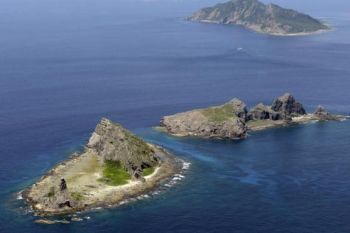
Publisher:
Bonnie King
CONTACT:
Newsroom@Salem-news.com
Advertising:
Adsales@Salem-news.com

~Truth~
~Justice~
~Peace~
TJP
Nov-30-2013 20:55

 TweetFollow @OregonNews
TweetFollow @OregonNews
China Escalates Senkaku Dispute to Divert Attention from Slowing Economy
Dr Stefan Lippert Special to Salem-News.comUS Secretary of State John Kerry said America was ‘deeply concerned’ about China’s announcement and warned that ‘Escalatory action will only increase tensions in the region and create risks of an incident.’
 Tensions between China and Japan are raised over uninhabited Senkaku islands. Photo: dpa |
(TOKYO ) - CHINA’S new leadership under President Xi Jinping has upped the stakes in its dispute with Japan over a couple of uninhabited islands in the East China Sea, after a year of thaw and intense behind-the-scenes negotiations.
The negotiations were aimed at maintaining stable economic relations between the two East Asian powerhouses.
But China announced on November 23, 2013, that it was setting up an ‘air defence identification zone’ to guard against ‘potential air threats’ over territory which includes islands governed by Japan. The zone covers a wide area of the East China Sea between South Korea and Taiwan.
Japan nationalised some of the islands in 2012 and has confirmed it will not cede sovereignty or even acknowledge a dispute with China. It has accused its neighbour of trying to change the status quo through intimidation.
China and Taiwan both claim the Senkaku Islands, which are known as Diaoyu in Mandarin.
The dispute has culminated in verbal attacks, diplomatic and political gestures, and cat-and-mouse games between unarmed ships in waters surrounding the islands.
The ‘air defence identification zone’ escalated the dispute to a more dangerous level as it explicitly mentions the potential use of military force.
Beijing stated that ‘China’s armed forces will take defensive emergency measures to respond to aircraft that do not cooperate in identification or refuse to follow orders’.
China has sent its first planes, including fighter jets, to enforce the rules. Japan scrambled its own fighter jets when two Chinese reconnaissance planes flew within 40 km of Japan’s air space, according to Tokyo’s Ministry of Defence.
The United States has about 70,000 troops in Japan and South Korea and has de-facto control of the airspace over the East China Sea.
US Secretary of State John Kerry said America was ‘deeply concerned’ about China’s announcement and warned that ‘Escalatory action will only increase tensions in the region and create risks of an incident.’
He urged China not to implement its threat.
US Defence Secretary Chuck Hagel repeated that the disputed islands are covered by the US - Japan security treaty. This means America would defend Japan if the area is attacked. Mr Hagel added that China’s announcement ‘will not in any way change how the United States conducts military operations in the region’.
China is escalating tensions at a time when economic relations with Japan have mostly recovered from the abyss following clashes over the Senkaku Islands in 2012.
China’s new leadership wants to demonstrate that it has taken full control of the country and its armed forces after a year of transition.
But more importantly, it aims to distract attention from its failure to deliver on its promise of annual eight per cent growth which has been a crucial element of the implicit covenant between China’s population and its rulers.
China’s population has come to believe the projections that China will overtake the United States in terms of total gross domestic product in the 2020s. Goldman Sachs has forecast that this likely to happen by 2027.
However, overtaking America’s GDP by 2027 is only realistic if a continuous annual GDP growth rate of at least seven per cent is assumed. This is highly unlikely and growth of five or six per cent is more realistic.
The future of the current political system depends on whether the Chinese population will accept the lower growth rate or not.
There are two scenarios, one where the Chinese population accepts lower growth rates and allows the Communist Party to stay in power because it is better than chaos and a decade of uncertainty. The other is that the Communist Party faces a rapid decrease in credibility and support.
This may encourage China's leaders to focus on island disputes with Japan, Vietnam and the Philippines if living standards cannot be improved.
Japan is China’s third-largest trade partner and a key provider of much-needed infrastructure and industrial technology as well as investment.
Japan is also the United States' most important ally. The US has made it absolutely clear that it will protect Japan with military force against a unilateral move by a third party against the islands.
China has tested the waters many times and not received the signal it has hoped for - appeasement from Washington.
Japan would be pressed to retaliate, with the full support of the US forces in the region, should China decide to conquer the islands.
China’s leadership is aware of the odds and hence unlikely to significantly step up its policy against Japan.
About the Author
World Review author Professor Dr Stefan Lippert is a business school professor and management consultant who has been based in Tokyo since 2005. He teaches international corporate strategy and leadership at Temple University, Japan Campus, and other universities in Japan and overseas. He is an active scholar and author in the areas of globalisation and organisational transformation.
Copyright
© 2013 Geopolitical Information Service http://www.worldreview.info
 |
 |
 |
Articles for November 29, 2013 | Articles for November 30, 2013 | Articles for December 1, 2013
Salem-News.com:





Terms of Service | Privacy Policy
All comments and messages are approved by people and self promotional links or unacceptable comments are denied.
[Return to Top]
©2025 Salem-News.com. All opinions expressed in this article are those of the author and do not necessarily reflect those of Salem-News.com.